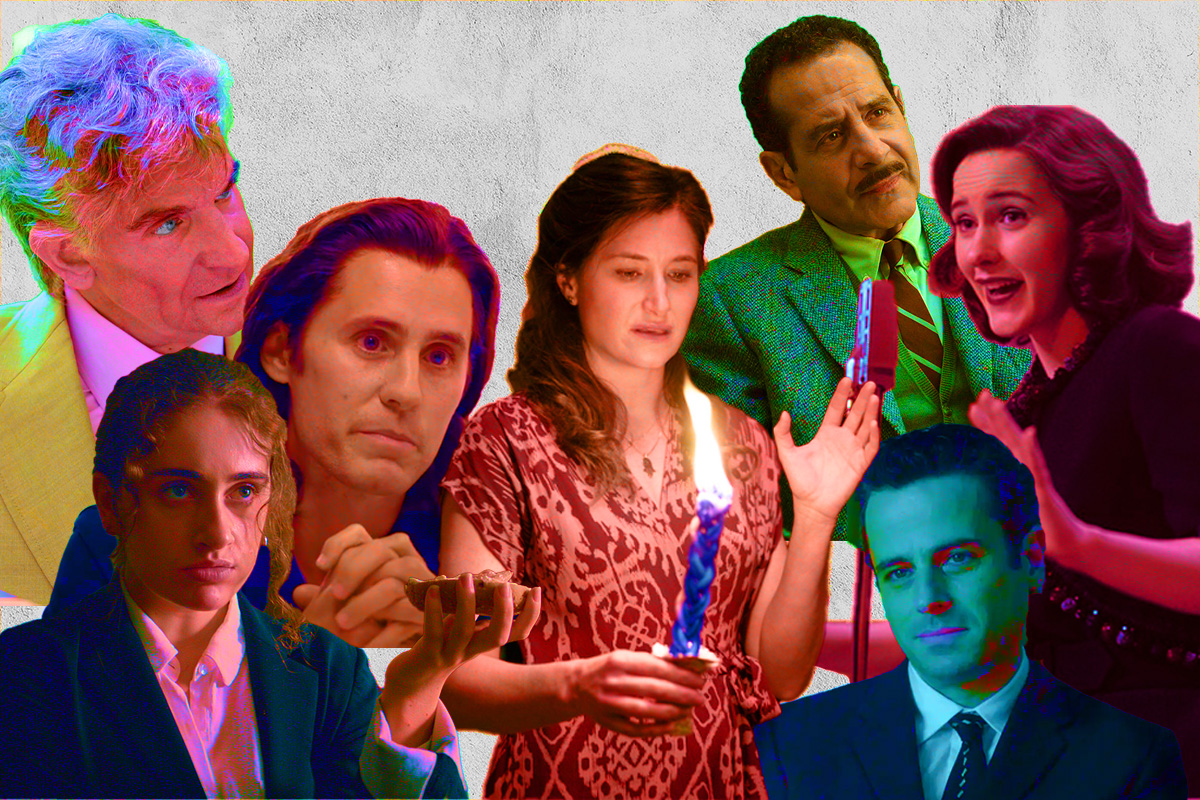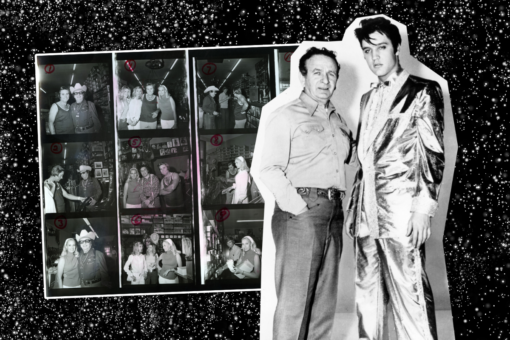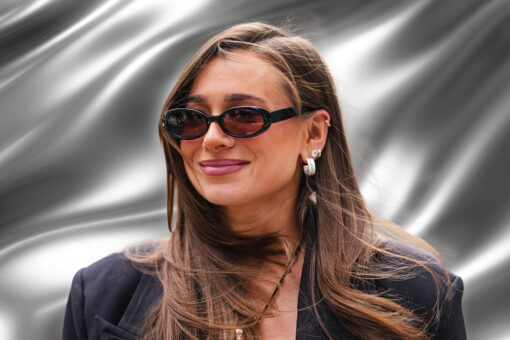In 2017, I thought I’d found my new favorite show in “The Marvelous Mrs. Maisel.” The show follows Midge Maisel, a young female Jewish comic, as she tries to make it in the male-dominated world of stand-up, after a revelation of infidelity leads to the dissolution of her marriage. It’s a great show, with deeply drawn, hilarious, often bewildering characters and a quirky optimism that makes you want to leap inside the screen.
It almost makes you forget that it’s the ‘50s, only a few years after a period of widespread antisemitism in the United States. This forgetting is part of the charm: To tell a story about a past era is to, by necessity, erase some of its less-pleasant aspects.
But that isn’t the only thing being erased in “Mrs. Maisel.”
It was perhaps the moment that Tony Shalhoub, the non-Jewish actor who plays Midge’s Jewish father, said the word “macher” that I realized something was off. Or perhaps it was Luke Kirby’s caricatured portrayal of Jewish comedian Lenny Bruce. Even Midge herself, played by non-Jewish actor Rachel Brosnahan, felt somewhat forced. There was something about these actors, the way they were trying to mimic not just specific accents, but a Jewish pattern of speech, the lifting and falling and ending on a question that we get from Yiddish and other dialects, that felt false. Ultimately, I stopped watching, despite wanting to watch more.
This show might be a prime example, but casting non-Jewish actors in distinctly Jewish roles is widespread: Non-Jewish actor Kathryn Hahn (who plays Rabbi Raquel on “Transparent”) was cast as Joan Rivers in the Showtime biopic series “The Comeback Girl” before the project was quickly shelved. Recently, Rachel Sennott — a non-Jewish actor who made her career playing a young Jewish college student in Emma Seligman’s “Shiva Baby” — played another Jewish role in “Tahara,” about a Hebrew School class in mourning. Earlier this year, Jared Leto donned a prosthetic nose to portray Adam Neumann, the Israeli WeWork founder, in AppleTV’s “WeCrashed.”
The phenomenon of a non-Jewish actor playing a Jew is called Jewface, and in an era when tone-deaf or offensive casting decisions are increasingly being called out, it somehow remains commonplace. Comedian Sarah Silverman has specifically decried portrayals — like Leto’s and Shalhoub’s — which come with either prosthetic noses or stereotypical gestures. As she recently said, “in a time when the importance of representation is seen as so essential and so front and center, why does ours constantly get breached?”
That’s my question, too.
Some people disagree with the premise. Caroline Aaron, one of the actual Jewish actors in “Maisel,” spoke to the Times of Israel in February, explaining she is “very concerned that we are confining the art of acting to ‘you have to be it to play it.’” She has no issue with non-Jewish actors playing Jewish roles, believing “acting in its purest form is taking a walk in someone else’s shoes. And ultimately, isn’t that the definition of empathy?”
It’s an explanation that echoes ongoing conversations about straight, cisgender actors taking on queer and trans roles. Famously, Scarlett Johansson told the press (after the “Rub & Tug” debacle) that she should be able to “play a tree” if she wanted to.
But acting isn’t a non-political thing: It never has been. Who gets to play roles that engage their full humanity — and who is limited to being the sidekick or comic relief — has always been political.
As Jews, we know this better than most. Jews in entertainment have always put on other skins in order to be seen or, in some cases, to hide in plain sight. In the early sound era, Jewish performers such as Al Jolson and Eddie Cantor made their names by doing full-Blackface minstrel acts in their movies. It was an era when entertainers found it totally acceptable to pretend to be other races, genders and identities — Eddie Cantor dressed in drag several times in his films and the “Greek” dialect comedian Parkyakarkus on his radio show was actually a Jewish man (and the father of Jewish auteur Albert Brooks).
It’s an uncomfortable legacy, but one that we have to understand when talking about our relationship with entertainment. That’s because a lot of this identity-borrowing was part of the sleight-of-hand that allowed publicly Jewish performers to get onscreen in the first place.
For a long time, being identifiably Jewish meant you were contractually obligated to not “get the girl” or even be seen as a traditional romantic hero. For Jewish actors, slipping into other identities granted them a lot more freedom to push the boundaries of identity (because they didn’t always have to play as Jews), but it also hemmed them in (because they still had to be characters on the fringe). Precisely because Jews were deemed not fully people, they were “allowed” to play everyone under the sun, as long as they remained objects of entertainment for the dominant culture.
But it was unacceptable then, and it’s unacceptable now. Asking actors to have some relationship to the part they play doesn’t have to be an exercise in censorship or an attack on the craft. It can be a way to establish trust with an audience that’s all too used to different forms of minstrelsy.
As someone who is both Jewish and trans, the relationship between the two identities is not lost on me, especially when it comes to representation. On Broadway this year, a musical version of “Mrs. Doubtfire” opened to favorable reviews. Darren Star’s just-released “Uncoupled” has trans and nonbinary folks as the butt of the joke. As recently as 2015, actors like Eddie Redmayne, Jeffrey Tambor and (again) Jared Leto were getting critical praise and award nominations for deigning to play trans characters. The implications of straight, cisgender actors playing trans roles — often to laughs — are frightening, but it’s hardly new. What people see onscreen often translates to real-world hatred, especially when it comes to the portrayal of minority identities. We’ve always known this, but we’re just getting to the point where we can actually acknowledge it as a society. For trans people, who have long been portrayed onscreen as killers and deceivers or objects of ridicule, positive representation is paramount.
For white Jews, bad representation is less clearly connected to real-world violence. But it’s not hard to connect the dots between the early days of Weimar antisemitic propaganda and the antisemitic caricatures and memes which have proliferated online and among the alt-right since Trump’s election in 2016. We’ve learned enough about how media works to understand that shoddy representation can lead to a more permissive atmosphere when it comes to antisemitic behaviors.
Though Jews have always been stereotyped as being a powerful majority in the American entertainment industry, shows like “Mrs. Maisel” (and the very media spaces we’re accused of magically controlling) still use big fake noses and exaggerated accents as stereotypes in their world-building. It’s the kind of thing that instantly betrays the lack of authenticity to a Jewish viewer and makes us feel like we’re watching a parody of ourselves, or a fantasy of what we should be, as imagined by non-Jews. Either way, it’s unsettling.
In the fascinating 1947 film “Gentleman’s Agreement,” non-Jewish actor Gregory Peck plays the non-Jewish journalist Phillip Schuyler Green, who is struggling to write about the problem of American antisemitism after the Second World War. Finally, he finds the perfect angle: He’ll pretend to be Jewish for a few weeks and see how his relationship to the world changes. It changes, of course, far more than he bargained for. His son comes home from school crying after being called a “dirty kike,” and his upper-crust fiancée books a honeymoon suite at a hotel where Jews aren’t allowed — a reference to the “gentleman’s agreement” of the title, whereby certain spaces were socially, if not lawfully, segregated. Green watches his world become smaller and gets quickly burnt out by actively fighting against the antisemitism he’s just waking up to.
But the most interesting part of the film comes at the end, when Green has a talk with his secretary, who is Jewish. When he “comes out” to her as not actually being a Jew, she tells him she knew already. There was something about his fire when faced with antisemitism, the fact that he hadn’t somehow become exhausted by it at this point. There was something that told on him, and she could feel it. Because just like with everything, people who have lived a certain life know when something rings false.
Perhaps it’s not an issue for the actors playing the roles. But for the audience — specifically the Jewish audience — there’s often a tell. Some people might not be bothered by it, but the danger is still real. It even applies to different identities within Judaism: The Sephardic experience is not the Ashkenazi experience, and the American Jewish experience is not the same as any Jewish experience outside of it. How could it be? When you put on the skin of something that isn’t yours, it might not look or feel like the minstrelsy of old, but it’s in dialogue with it.
Perhaps it’s time to end this particular dialogue — or, at the very least, acknowledge the harm it does, and the limits it has.



